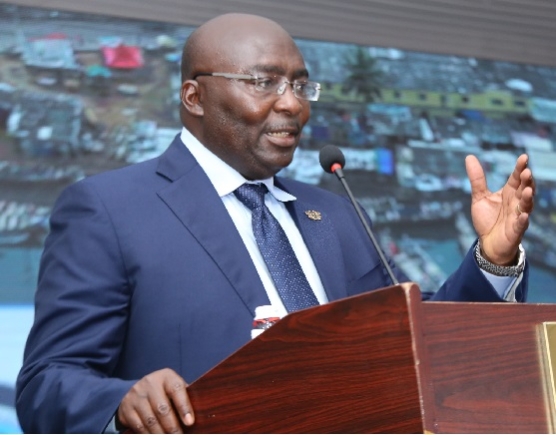
Collaboration key to protecting coastal resources — Dr Bawumia
The Vice-President, Dr Mahamudu Bawumia, has called for a strong collaboration between various sectors in the blue economy and international partners if the country would succeed at protecting and rehabilitating its coastal resources.
He said, there must also be investments in research and technology, the establishment of comprehensive marine protected areas and minimising coastal pollution in order to protect biodiversity and promote tourism.
That, Dr Bawumia said, would help address climate change, manage carbon emission and strengthen regulations.
The Vice-President made the call when he addressed the third conference on fisheries and coastal environment in Accra yesterday.
It is on the theme: “Inclusive blue economy in Africa: Towards sustainable transformation of the marine environment”.
Participants were drawn from academia, government establishments, industry and the media.
The three-day conference is being organised by the Centre for Coastal Management - Africa Centre of Excellence in Coastal Resilience (CCM-ACECoR) of the University of Cape Coast (UCC) and other strategic partners, including the World Bank, WACA, USAID and Vulnerability to Viability Global Partnership.
Blue economy
Dr Bawumia said that the ocean presented a huge opportunity to accelerate development and improve upon the well-being of the citizens, adding that a successful blue economy in the country would lead to job opportunities for the youth as well.
He said the government was, therefore, seeking collaboration and shared knowledge to build a blue economy that was not limited by borders.
Citing the US as one of the countries with a successful blue economy, the Vice-President said: “I believe that Ghana has a great future and we can also get there through hard work and dedication.”
“Ghana, with its extensive coastline, is committed to leading the charge towards a sustainable and inclusive blue economy.
“I want to emphasise that the blue economy is not just an economic opportunity; it is a moral imperative as well. We are the stewards of our oceans, entrusted with their preservation for future generations,” he added.
Efforts
Dr Bawumia further said that the "Ghana beyond aid" initiative of the government extends to the oceans and, therefore, “we are investing in modern fishing technologies, aquaculture, and coastal infrastructure; creating jobs and protecting our marine environment.”
He also said that a loan of $150 million was approved by the World Bank on a West Africa Coastal Area (WACA) programme to stem the tide of coastal degradation occurring in some areas of the country.
The Vice-President added that the government had begun various activities to fight illegal, unreported and unregulated fishing, including regulating the licence of foreign fishing vessels, especially fishing gears, where they fish and whether they have licences to do so or not.
“In fact, some of these foreign vessels have been denied licences already. We have also digitised the access to pre-mix fuel for artisanal fishing activities.
“The introduction of a digitised premix fueling station was meant to automate the system to reduce issues such as hoarding, politicisation and diversion among others, he said.”
Marine biotechnology
The Pro-Vice-Chancellor of the University of Cape Coast, Prof. Rosemond Boohene, stressed the need to harness the power of marine biotechnology to develop new eco-friendly products and pharmaceuticals.
She said the country could also leverage renewable energy sources such as wave energy to reduce the large-scale dependence on fossil fuel, thereby contributing to climate change mitigation.
For his part, the Director of the Centre for Coastal Management, Prof. Dennis Aheto, said his outfit was mobilising to co-create and co-identify the challenges and research on them.
He said based on the research output, they would be able to inform policy development not just in the country, but across the region.
